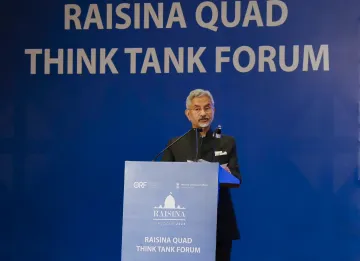'Others cannot have a veto on choices of like-minded nations': Jaishankar's veiled attack on China
Jaishankar noted that the Quad is facilitated by the emergence of the Indo-Pacific, adding it is propelled by a change in the global order that requires "more" and "not less collaboration".

New Delhi: The Quad is a statement that others cannot have a "veto" on choices of like-minded nations and the coalition is here to stay, grow and contribute to global prosperity, External Affairs Minister S Jaishankar said on Saturday, amid mounting global concerns over China's rising assertiveness in the Indo-Pacific. In an address at a think-tank forum, Jaishankar described the coalition of India, the US, Japan and Australia as an "overhead light" that is a "creative, flexible, nimble, responsive and open-minded" enterprise.
The Quad has largely been focusing on bolstering cooperation to ensure a free, open and inclusive Indo-Pacific in the face of Chinese belligerence. The external affairs minister said the Quad reflects the growth of a multipolar global order and its central approach is collaborative, and not unilateral. "All four governments have behaved differently from how they normally do. The Quad is an overhead light -- creative, flexible, nimble, responsive and open-minded enterprise. These are not adjectives we normally associate with the bureaucracy," he said explaining the principles that the grouping stands for.
Jaishankar highlights the importance of QUAD
Jaishankar also said that the Quad has five messages, "One -- it reflects the growth of a multipolar order; two -- it is post-alliance and post-Cold War thinking; three -- it is against spheres of influence; four -- it expresses the democratising of the global space and a collaborative, not unilateral approach and five -- it is a statement that in this day and age, others cannot have a veto on our choices," he said.
VIDEO: EAM remarks at the inaugural Quad Think Tank Forum
He noted that the Quad is facilitated by the emergence of the Indo-Pacific, adding it is propelled by a change in the global order that requires "more" and "not less collaboration". Jaishankar asserted that the Quad "is here to stay, the quad is here to grow and the quad is here to contribute," calling for making it more contemporary, relevant and more impactful.
Joining through virtual mode, Australian Foreign Minister Penny Wong said Quad stands for a region that is free from intimidation and coercion", where competition is managed responsibly and disputes are settled in accordance with international law.
Japanese foreign minister Yoko Kamikawa, in a brief video message, said the world is facing deep divisions and it is necessary to maintain and strengthen a free and open international order based on the rule of law. "For this reason, Japan with its allies and like-minded countries is working to further develop a free and open Indo-Pacific based on the rule of law," she said.
"Quad is one of the most important initiatives to this end, has steadily implemented initiatives in maritime critical and emerging technologies, cyber and counter-terrorism, initiatives must continue to move forward," she added.
Quad is not about forcing the region to choose between strategic competitors: US
US Deputy Secretary of State Kurt Campbell said the Indo-Pacific remains the world's most dynamic and rapidly evolving region and that the strength of the Quad is its ability to harness the capabilities and resources of the four nations together to deliver concrete outcomes that benefit all. Campbell spoke virtually on behalf of US Secretary of State Antony Blinken. "I want to emphasise the defining feature of our partnership -- the Quad stands for an affirmative vision of a free and open Indo-Pacific in which we collectively build the capacity of our allies and partners," he said.
"Quad is not about forcing the region to choose between strategic competitors, it is about preserving and creating options so that communities, institutions and countries can make decisions to benefit their people," he said.
In his remarks, Jaishankar also asserted that there should be no doubt about ASEAN (Association of Southeast Asian Nations) centrality in the Indo-Pacific. "I think anybody who doubts Asian centrality when they look at a map of the Indo-Pacific clearly missed their geography classes in school," he said.
(With inputs from agency)
Also Read: 'Mind games will be played': Jaishankar on India-China relations at Raisina Dialogue